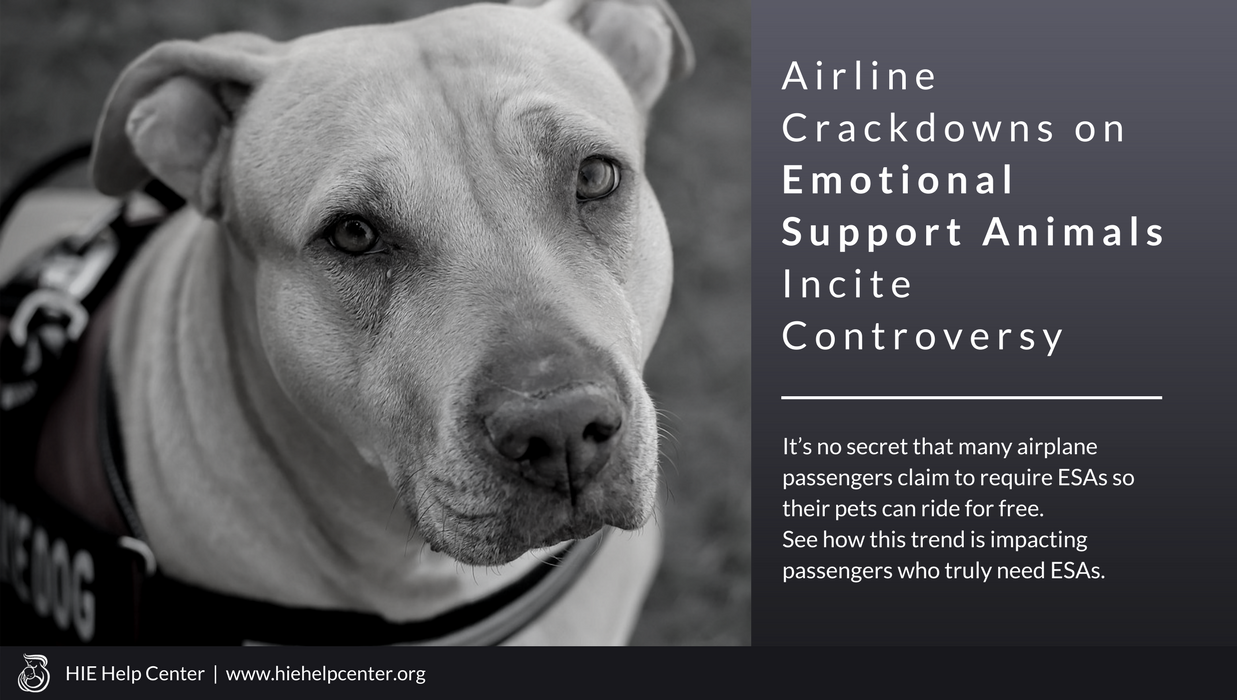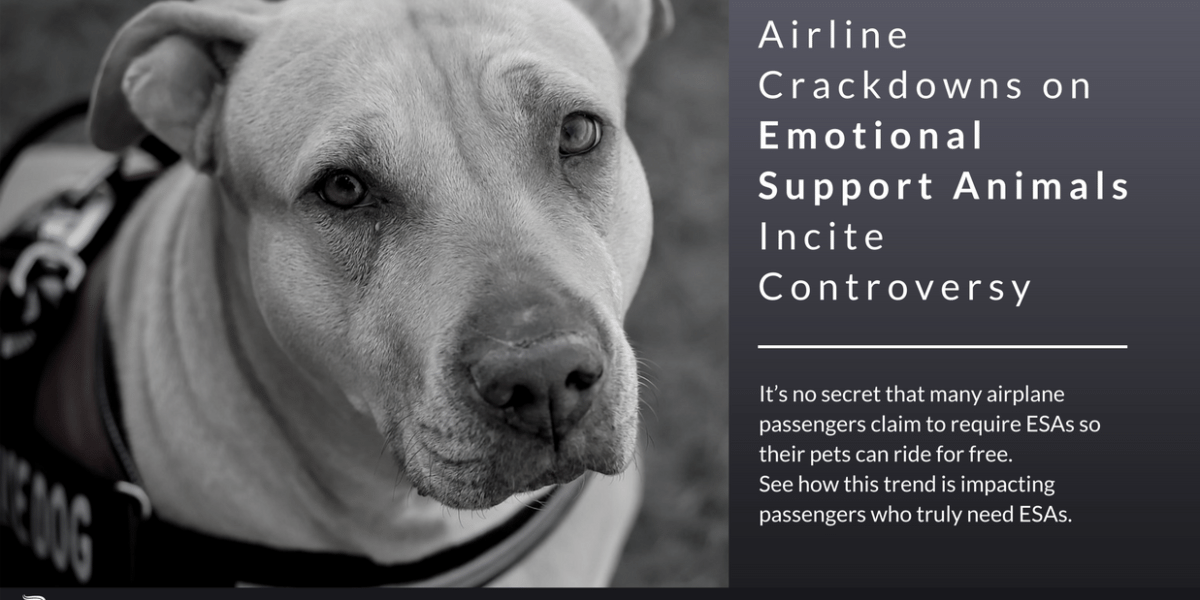Airline regulations on service and emotional support animals have historically been pretty flexible. This helps the people who truly need these animals to avoid cumbersome paperwork and be able to travel more spontaneously. However, the lack of bureaucratic oversight has also allowed many people to claim that their untrained pets are in fact ESAs (or trained service animals, but that is generally thought to be harder to fake). New York Times columnist David Leonhardt notes that pretty much anyone can pull this off:
“For $30 on Amazon, you can buy a bright-red dog vest that reads, EMOTIONAL SUPPORT. With a quick web search, you can find a therapist to diagnose you long-distance. Fill out a form, and suddenly you’re certified as having an illness that requires animal attention” (2).
For passengers who legitimately need an ESA, such as those with autism spectrum disorder, PTSD, or intense anxiety, this flexibility is very important. Unfortunately, claiming to require an ESA is also a convenient, cheap way to fly with one’s pet, and many have taken advantage of this. Several airlines report that this is a growing hygiene and safety concern, and are increasing regulations to prevent this from happening. Read on to examine the root causes of the issue, as well as some responses to the new policies.
A way around fees and size requirements
Once an animal has been designated as an ESA, they can fly for free. Without that designation, the owner would have to pay a pet fee (for example, Delta charges $125 for a one-way trip), and would be subject to a quota on the number of pets on each flight. Additionally, pets must fit size requirements, and remain confined to carriers throughout the flight. ESA’s don’t face the same restrictions.
The problems with imposter service animals
Each year, approximately 250,000 service and support animals fly with passengers on Delta flights. This figure has skyrocketed in recent years, as has the number of animal-related incidents. Since 2016, Delta has seen an 84% increase in reports of urination, defecation, and biting. If those behaviors don’t sound characteristic of fully-trained service and support animals, that’s because many animals flying in-cabin are actually untrained pets masquerading as essential flight companions. It’s not just dogs and cats, either. In a recent statement, Delta said that, “Customers have attempted to fly with comfort turkeys, gliding possums known as sugar gliders, snakes, spiders, and more” (1).
How do fake emotional support animals negatively affect people who actually require service animals?
At first blush, masking a non-ESA pet as a support animal may feel like a white lie. Or as Leonhardt put it, “I’m not going to claim that flying pets are one of the country’s biggest problems right now.” However, as Delta noted, there have been many incidents involving untrained pets. It’s not just urination, defecation, and minor biting, either – one man was attacked by a 70 pound dog, requiring 28 stitches to mend his facial wounds (1, 3). Passengers with disabilities have also reported untrained pets attacking or otherwise bothering service animals (1). Even incessant barking can be dangerous; for example, it can distract a seizure alert dog from doing its job (4).
Moreover, it is important to note that even pets who are unlikely to attack or exhibit other behavioral issues can still make flights very unpleasant for allergy sufferers. Airlines must of course work to balance the rights of passengers with disabilities with the comfort of those with allergies, but the abundance of fake ESAs has made this a challenging task (2). Finally, passengers who bring along pets in “emotional support” vests make it harder for people with legitimate needs to be taken seriously. Travelers with allergies or fear of animals, or those who are simply annoyed by their presence, often treat owners of real service/support animals with suspicion – especially if they have previously encountered obvious imposters. Those with “invisible” disabilities, such as an emotional disorder, may be the most likely to suffer from others’ scorn.
Airlines increasing regulations regarding service and emotional support animals
Delta recently announced new regulations, effective March 1st, 2018. Any passenger flying with a service or support animal will now need to provide proof of the animal’s health and/or vaccination record, as well as a signed document stating that the animal can behave, both 48 hours in advance. This is in addition to the preexisting requirement of providing a letter of need from a doctor or licensed mental health professional. In developing this new protocol, Delta sought advice from its 15-member Advisory Board on Disability, which is “composed of diverse Delta frequent flyers with a range of disabilities” (1).
It appears that other airlines are following suit. In response to Delta’s announcement, American Airlines released a statement saying that they “agree with Delta’s efforts,” and that they would “continue to support the rights of customers…with legitimate needs,” but that more regulations should be in place (3). Additionally, United Airlines recently released a policy similar to Delta’s (5).
Opposition from disability rights organizations
Although many disability rights advocates agree that fake support animals are a growing problem, several organizations have expressed concern about the specifics of these new policies.
The National Federation of the Blind (NFB) has written that some elements of Delta’s policy violate the Air Carrier Access Act. This law protects the rights of passengers with disabilities, including – unlike the Americans with Disabilities Act – those who require ESAs. The NFB states that,
“We are particularly troubled by the requirement that guide dog users submit paperwork to Delta forty-eight hours before flying. Travelers without guide dogs are not required to plan their travel forty-eight hours in advance. Furthermore, guide dog users will no longer be able to fly Delta in family, medical, or other emergencies. We believe that this forty-eight hour requirement is both unnecessary and unlawful” (6).
The American Council of the Blind (ACB) expressed similar sentiments:
“ACB believes that greater public outreach and more strict policies for those who are found to have committed fraud by posing pets as service or emotional support animals is a much more positive pathway toward resolving this issue. We stand willing to work with Delta and other airlines to find such solutions to this important issue” (7).
Animal welfare concerns
In an article for Consumer Affairs, Amy Martyn notes that these new airline policies fail to consider safety issues for pets. She writes that,
“Lost in the anger over fake service animals on airplane cabins is the lack of safe options available for people who need to transport larger, non-service animal pets across the country” (8).
Delta’s policy allows small pets to travel in the cabin, provided their owners pay an additional fee and keep them secured in a carrier. But larger pets must travel with the cargo, where animals in good health have been known to die. Since 2005, United Airlines has had 86 animal deaths and Delta 84 (although the rate seems to have at least decreased somewhat since they started flying animals with the cargo rather than with checked baggage).
The Humane Society of the United States cautions people against cargo travel for pets due to the lack of temperature control and risk of oxygen deprivation. They note that animals with “pushed-in” faces, such as pugs, bulldogs, and Persian cats, are especially vulnerable (9).
Although it is unclear whether safety concerns are a primary reason for people pretending to require ESAs (saving money likely also plays a role), airlines may want to consider how improving options for safe pet travel could help resolve this issue, in addition to of course keeping pets alive.
Conclusion: addressing underlying issues
People seem to agree that the presence of fake ESAs on flights is a problem, but there remains a great deal of controversy over how this should be handled. Regardless of what the best proximate solutions are, it is important to address a couple of underlying issues. One of these is the lack of safety precautions taken for animals traveling in the cargo. A second problem seems to be a lack of awareness of how pretending to need an ESA can negatively affect other passengers, especially those with disabilities. As the American Council of the Blind mentioned, public outreach campaigns may be helpful.
Above all, this is a societal issue. People are failing to consider how their selfish actions could have a long-term negative impact on those with disabilities and legitimate emotional conditions. Leonhardt sums this up quite nicely:
“The whole bizarre situation is a reminder of why trust matters so much to a well-functioning society. The best solution, of course, would be based…on simple trust. People who really needed service animals could then bring them on planes without having to carry documents. Maybe a trust-based system will return at some point. But it won’t return automatically. When trust breaks down and small bits of dishonesty become normal, people need to make a conscious effort to restore basic decency.”
Do you think fake ESAs are a problem? And if so, what should be done? Let us know in the comments!
Sources
- Delta News Hub – Delta introduces enhanced requirements for customers traveling with service or support animals effective March 1
- The New York Times – It’s Time to End the Scam of Flying Pets
- NBC News – Delta sets new guidelines on service animals allowed on board
- Outside Online – Stop Faking Service Dogs
- The Washington Post – United changed its policy for emotional-support animals. That peacock still can’t board.
- Consumer Affairs – Pet deaths go unmentioned in Delta’s service animal crackdown
- The Humane Society of the United States – Travel safely with your pet by car, airplane, ship or train
Related Reading
- Service Animals for Children with Disabilities
- Seizure Dogs
- Epilepsy, Seizures, and Seizure Disorders
- Behavioral and Emotional Disorders
- Hearing and Visual Impairments
- Know Your Rights: Three Important Federal Laws that Protect People with Disabilities
- Finding Accessible Vacation Destinations and Activities



Leave a Reply
You must be logged in to post a comment.